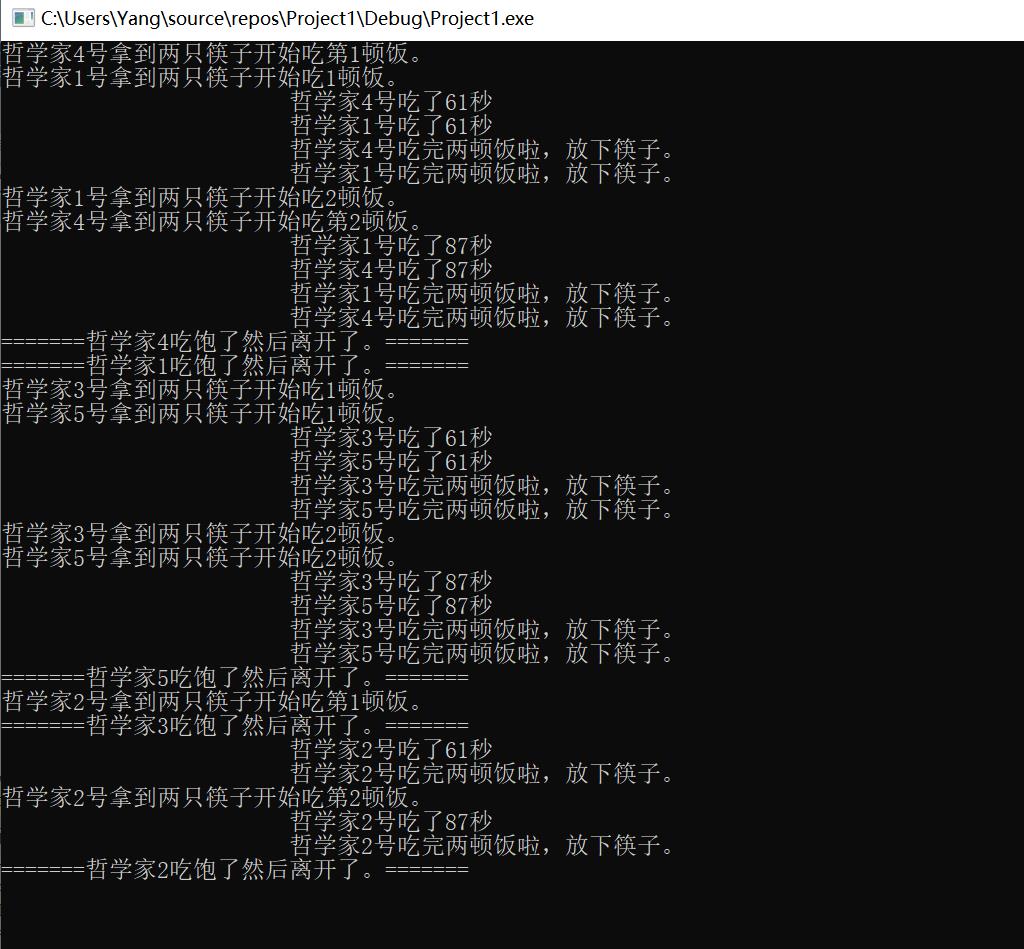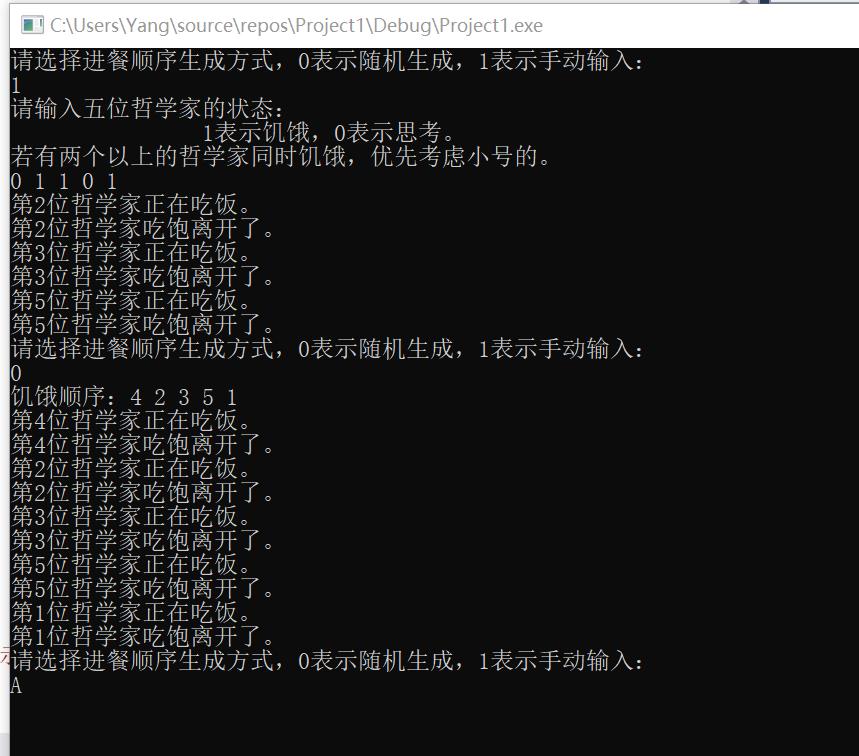进程调度模拟——哲学家进餐问题
Posted 流楚丶格念
tags:
篇首语:本文由小常识网(cha138.com)小编为大家整理,主要介绍了进程调度模拟——哲学家进餐问题相关的知识,希望对你有一定的参考价值。
一、开发环境
开发平台: Visual C++6.0
开发环境: Windows XP
开发语言: C语言+API(windows应用程序编程接口)
二、进餐问题
一个圆桌上有一大碗面,5个盘子,5把筷子,5个座位上可以座5个哲学家,当哲学家就坐以后,其左右有且仅有一个筷子,每个筷子左又有且仅有一个哲学家。哲学家动作:思考,取筷(需要两个),取面,吃面。现设计一个礼仪以允许他们就餐,需要避免两个哲学家“抢”同一把筷子,又要避免饥饿和死锁。

三、系统分析
- 互斥解决。每一把筷子使用一个2元信号量,只有获得信号量的哲学家才能使用筷子,从而避免对筷子的“抢夺”。
- 死锁和饥饿解决。餐厅只允许最多4名哲学家进入,因为总有一个哲学家可以得到两把筷子,从而可以正常就餐,因此不会有死锁出现。每为哲学家就餐完毕后,立即离开,放下筷子,以便没有用餐的哲学家可以使用,这也能保证不会有饥饿的存在了。
- 就餐顺序随机。为了较真实地模拟现实就餐问题,哲学家每次进入餐厅的顺序总是随机的,这个随机顺序在哲学家开始进入之间通过一个函数产生(这个过程会花一定时间)。
- 哲学家的各种状态。
位置空闲:当哲学家没有就座的时候,该位置显示空闲状态。
思考等待:当一个哲学家进入餐厅但是没有获得餐具就餐的时候,进入思考等待状态。
就餐:哲学家获得餐具后开始就餐进入就餐状态(就餐时间8000ms)。
离开:哲学家就餐完毕就到了离开状态。 - 每个哲学家的就餐过程通过一个线程函数的调用来实现。
四、程序流程图
五、源代码
5.1 多线程实现
代码如下:
// 解决哲学家就餐问题
// 每个哲学家可用一个线程来模拟。
// 设有5个哲学家,5只筷子,每个哲学家吃饭时间为一个随机值,哲学家吃饭后的思考时间也是一个随机值。
#include <Windows.h>
#include <iostream>
#include <cstdio>
#include <stdlib.h>
#include <time.h>
/*
(1)奇数号的哲学家先拿起右边的筷子再拿起左边的筷子。
(2)偶数号哲学家先拿起左边的筷子,再拿起右边的筷子。
(3)如果哲学家抢到一只筷子,在抢占另一只筷子时失败,则要放弃已经抢占到的资源。
(4)左右两边都抢到筷子的哲学家,吃完放后释放资源。*/
using namespace std;
HANDLE chop[5];
HANDLE ph[5];
HANDLE mutex;
int nums = 0;
int random()
return rand() % 100 + 20;
void eating(int id)
int num = random();
Sleep(num);
printf("\\t\\t\\t哲学家%d号吃了%d秒\\n", id, num);
DWORD WINAPI phthread(LPVOID param)
nums++;
int id = nums;
int lc = id - 1;
int rc = id % 5;
int times = 0;
int ret1, ret2;
while (true)
Sleep(100);
if (times >= 2)
break;
if (id % 2 == 0)
ret1 = WaitForSingleObject(chop[lc], 0);
if (ret1 == WAIT_OBJECT_0)
ret2 = WaitForSingleObject(chop[rc], 0);
if (ret2 == WAIT_OBJECT_0)
WaitForSingleObject(mutex, INFINITE);
printf("哲学家%d号拿到两只筷子开始吃第%d顿饭。\\n", id, times + 1);
ReleaseMutex(mutex);
times++;
WaitForSingleObject(mutex, INFINITE);
eating(id);
ReleaseMutex(mutex);
WaitForSingleObject(mutex, INFINITE);
printf("\\t\\t\\t哲学家%d号吃完两顿饭啦,放下筷子。\\n", id);
ReleaseMutex(mutex);
ReleaseSemaphore(chop[rc], 1, NULL);
ReleaseSemaphore(chop[lc], 1, NULL);
else
ret1 = WaitForSingleObject(chop[rc], 0);
if (ret1 == WAIT_OBJECT_0)
ret2 = WaitForSingleObject(chop[lc], 0);
if (ret2 == WAIT_OBJECT_0)
WaitForSingleObject(mutex, INFINITE);
printf("哲学家%d号拿到两只筷子开始吃%d顿饭。\\n", id, times + 1);
ReleaseMutex(mutex);
times++;
WaitForSingleObject(mutex, INFINITE);
eating(id);
ReleaseMutex(mutex);
WaitForSingleObject(mutex, INFINITE);
printf("\\t\\t\\t哲学家%d号吃完两顿饭啦,放下筷子。\\n", id);
ReleaseMutex(mutex);
ReleaseSemaphore(chop[lc], 1, NULL);
ReleaseSemaphore(chop[rc], 1, NULL);
WaitForSingleObject(mutex, INFINITE);
ReleaseMutex(mutex);
printf("=======哲学家%d吃饱了然后离开了。=======\\n", id);
return 0;
int main()
srand((unsigned)time(0));
mutex = CreateMutex(NULL, false, NULL);
for (int i = 0; i < 5; ++i)
chop[i] = CreateSemaphore(NULL, 1, 1, NULL);
for (int i = 0; i < 5; ++i)
int j = i + 1;
ph[i] = CreateThread(NULL, 0, phthread, NULL, 0, NULL);
Sleep(10000); // 释放句柄
for (int i = 0; i < 5; ++i)
CloseHandle(ph[i]);
CloseHandle(chop[i]);
CloseHandle(mutex);
Sleep(500);
system("pause");
return 0;
运行结果为:

5.2 C语言模拟
代码如下(不太好):
#include<iostream>
#include<stdlib.h>
#include<string>
#include<time.h>
#include<windows.h>
using namespace std;
int l = 0;
int w = 0; //阻塞的进程个数,用来实现最多有四个哲学家同时拿筷子,避免死锁。
int s[5] = 1,1,1,1,1 ; //筷子的信号量
int come_order[5] = 0,0,0,0,0 ; // 就餐顺序
int wake[5] = 0,0,0,0,0 ; // 阻塞唤醒顺序
int *q = wake;
int p(int*);
int v(int*);
int pro(int);//执行
int p(int *i)//p操作
*i -= 1;
if (*i < 0)
w++;
return 1;
else return 0;
int v(int *i)
*i += 1;
if (*i <= 0) return 1;
else return 0;
void eat(int i)
cout << "第" << i << "位哲学家正在吃饭。" << endl;
Sleep(3000);
int pro(int i)
if (p(&s[i - 1]))
cout << "第" << i << "位哲学家请等待...." << endl;
return 1;
if (p(&s[i]))
cout << "第" << i << "位哲学家请等待...." << endl;
return 1;
eat(i);
if (v(&s[i]))
*(q + i) = 1;
if (v(&s[i - 1]))
*(q + i) = 1;
cout << "第" << i << "位哲学家吃饱离开了。" << endl;
return 0;
int get_rand() //产生1到5之间的整数
srand((unsigned)time(NULL));
int RANGE_MIN = 1;
int RANGE_MAX = 6;
int randn = rand() % (RANGE_MAX - RANGE_MIN) + RANGE_MIN;
return randn;
bool if_num_exist(int num)
for (int a = 0; a < 5; a++)
if (come_order[a] == num)
return true;
return false;
void get_rand_order()
//产生随机的进入顺序
int temp = 0;
bool tmp = 1;
for (int a = 0; a < 5; a++)
while (tmp)
temp = get_rand();
if (!if_num_exist(temp))
come_order[a] = get_rand();
tmp = 0;
tmp = 1;
cout << "饥饿顺序:" << come_order[0] << " " << come_order[1] << " " << come_order[2] << " " << come_order[3] << " " << come_order[4] << endl;
void get_order()
int p[5];
cout << "请输入五位哲学家的状态:" << endl << " 1表示饥饿,0表示思考。" << endl << "若有两个以上的哲学家同时饥饿,优先考虑小号的。" << endl;
cin >> p[0] >> p[1] >> p[2] >> p[3] >> p[4];
int a = 0;
for (int k = 0; k < 5; k++)
if (p[k] == 1) come_order[a++] = k + 1;
void main()
int c;
cout << "请选择进餐顺序生成方式,0表示随机生成,1表示手动输入:" << endl;
cin >> c;
if (c == 0) get_rand_order();
else if (c == 1) get_order();
else cout << "error" << endl;
while (w < 3)
for (int a = 0; a < 5; a++) if (come_order[a] != 0) pro(come_order[a]);
for (int a = 0; a < 5; a++) if (*(q + a) != 0) pro(*(q + a));
运行结果为:

以上是关于进程调度模拟——哲学家进餐问题的主要内容,如果未能解决你的问题,请参考以下文章